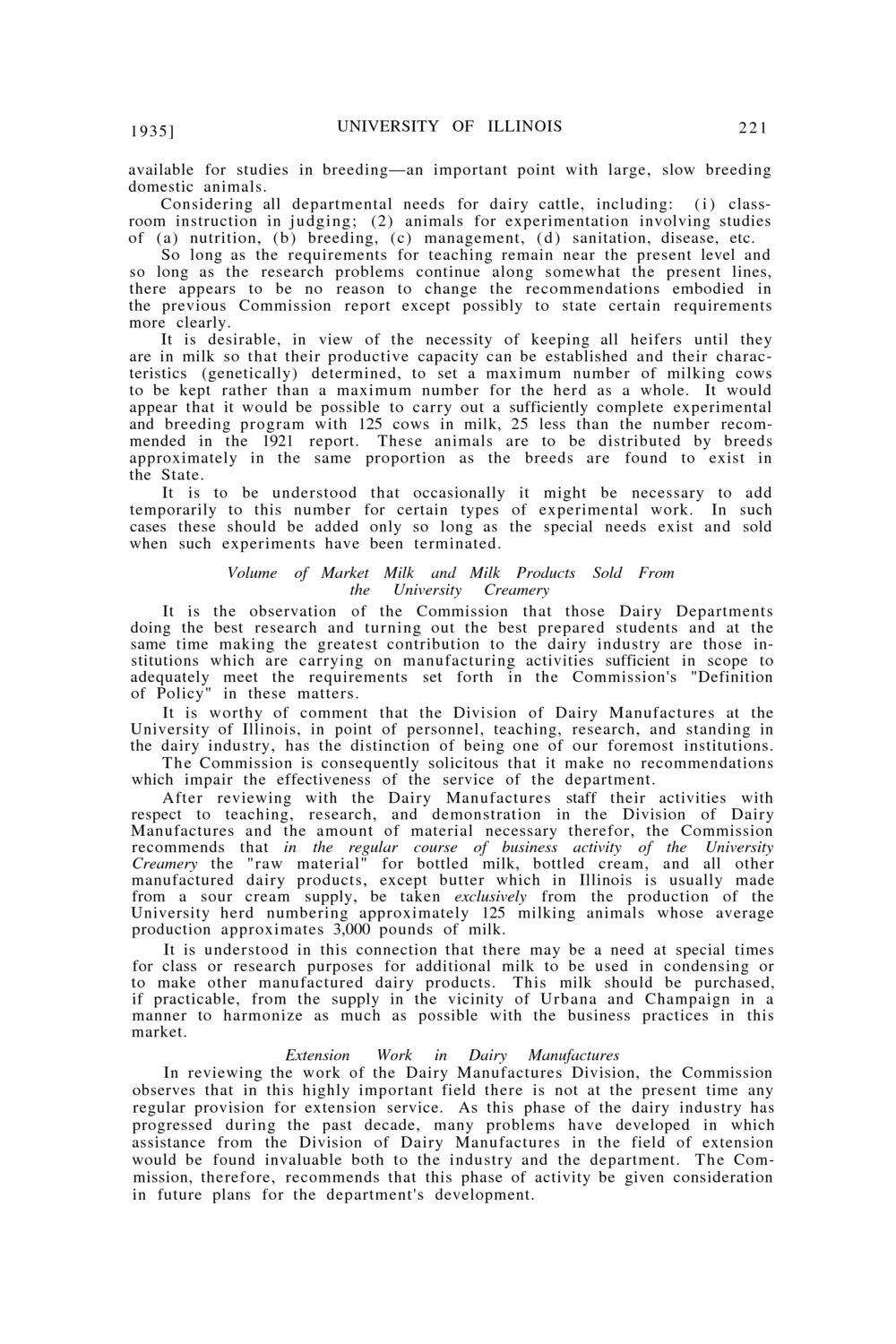| |
| |
Caption: Board of Trustees Minutes - 1936
This is a reduced-resolution page image for fast online browsing.

EXTRACTED TEXT FROM PAGE:
1935] UNIVERSITY OF ILLINOIS 221 available for studies in breeding—an important point with large, slow breeding domestic animals. Considering all departmental needs for dairy cattle, including: ( i ) classroom instruction in judging; (2) animals for experimentation involving studies of ( a ) nutrition, ( b ) breeding, (c) management, ( d ) sanitation, disease, etc. So long as the requirements for teaching remain near the present level and so long as the research problems continue along somewhat the present lines, there appears to be no reason to change the recommendations embodied in the previous Commission report except possibly to state certain requirements more clearly. It is desirable, in view of the necessity of keeping all heifers until they are in milk so that their productive capacity can be established and their characteristics (genetically) determined, to set a maximum number of milking cows to be kept rather than a maximum number for the herd as a whole. It would appear that it would be possible to carry out a sufficiently complete experimental and breeding program with 125 cows in milk, 25 less than the number recommended in the 1921 report. These animals are to be distributed by breeds approximately in the same proportion as the breeds are found to exist in the State. It is to be understood that occasionally it might be necessary to add temporarily to this number for certain types of experimental work. In such cases these should be added only so long as the special needs exist and sold when such experiments have been terminated. of Market Milk and Milk Products Sold From the University Creamery It is the observation of the Commission that those Dairy Departments doing the best research and turning out the best prepared students and at the same time making the greatest contribution to the dairy industry are those institutions which are carrying on manufacturing activities sufficient in scope to adequately meet the requirements set forth in the Commission's "Definition of Policy" in these matters. It is worthy of comment that the Division of Dairy Manufactures at the University of Illinois, in point of personnel, teaching, research, and standing in the dairy industry, has the distinction of being one of our foremost institutions. T h e Commission is consequently solicitous that it make no recommendations which impair the effectiveness of the service of the department. After reviewing with the Dairy Manufactures staff their activities with respect to teaching, research, and demonstration in the Division of Dairy Manufactures and the amount of material necessary therefor, the Commission recommends that in the regular course of business activity of the University Creamery the "raw material" for bottled milk, bottled cream, and all other manufactured dairy products, except butter which in Illinois is usually made from a sour cream supply, be taken exclusively from the production of the University herd numbering approximately 125 milking animals whose average production approximates 3,000 pounds of milk. It is understood in this connection that there may be a need at special times for class or research purposes for additional milk to be used in condensing or to make other manufactured dairy products. This milk should be purchased, if practicable, from the supply in the vicinity of Urbana and Champaign in a manner to harmonize as much as possible with the business practices in this market. Extension Work in Dairy Manufactures In reviewing the work of the Dairy Manufactures Division, the Commission observes that in this highly important field there is not at the present time any regular provision for extension service. As this phase of the dairy industry has progressed during the past decade, many problems have developed in which assistance from the Division of Dairy Manufactures in the field of extension would be found invaluable both to the industry and the department. T h e Commission, therefore, recommends that this phase of activity be given consideration in future plans for the department's development. Volume
| |